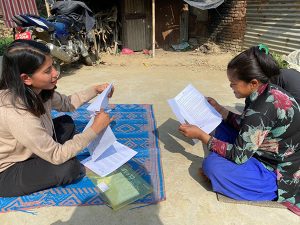Evaluation
Evaluation in the NAMASTE project involves conducting assessments at two distinct time points with families participating in the programme.
 Assessments will take place at baseline (before an intervention takes place) and at endline (after intervention delivery).
Assessments will take place at baseline (before an intervention takes place) and at endline (after intervention delivery).
A number of NAMASTE project members have been trained as assessors. The training ensured proficiency in the administration of the evaluation measures by master trainers, including programme co-ordinators and co-leads of the programme, who had extensive prior experience of administration of the measures.
The training involved two components: self-guided learning, and capacity building through interactive sessions with the master trainers.
 Training was also provided to assessors to help them understand the needs of the families involved in the project. For example, common themes across all four sites were that saving the parents’ time and being flexible to their needs was essential. Training the NAMASTE assessors on these concepts helped them to build trust with the families taking part in the project.
Training was also provided to assessors to help them understand the needs of the families involved in the project. For example, common themes across all four sites were that saving the parents’ time and being flexible to their needs was essential. Training the NAMASTE assessors on these concepts helped them to build trust with the families taking part in the project.
Other strategies, such as regular contact with families, has helped to keep dropout rates low. Additionally, multiple safeguarding measures have been implemented to ensure the safety and comfort of both the assessors and the families involved.
